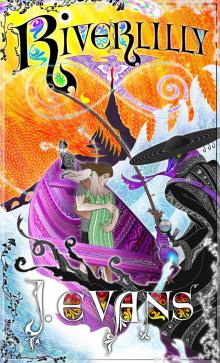- Home
- William Young
Riverlilly Page 9
Riverlilly Read online
Page 9
Chapter the Sixth,
The Third to Last Day,
In which water is reduced to stone.
I. An Unexpected Turn
“My name is Cliff,” said the jesterfish. “Please, follow me. Don’t mind your wet clothes, of course, but you will have to get a haircut before you see the King.”
Jai and Ceder both said, “Who, me?” and the jesterfish chuckled pleasantly. Floating in clear water inside his glass ball, he seemed to hang suspended in midair.
From far below, the glorious ring of conch shells and the raucous cheers from mermen soldiers filled the air. Fish of all shapes and sizes leapt out of the sea in acrobatic displays. Waterworks were launched into the sky, bursting into multicolored showers of flower-shaped rain. Jai and Ceder sat watching the celebration and forgot at once that Cliff was waiting for them.
“I assure you, the party will carry on for days and weeks, if not months,” said the jesterfish in a voice that suggested he would prefer to join the festivities below if given the choice. “Such a thing as this! The King may very well award every soldier with an apple. Fish love nothing so much as a fresh apple, you know. With a nice, big worm inside. Yes, this may very well carry on for years.” He swam a backward somersault, causing his ball to begin spinning in place in the water, but he could not move forward without friction. “A little help, if you would be so kind?”
Ceder gave the ball a tap to get it started and Cliff rolled out of the pool and up to the pearl doors. “I wonder how he gets in and out of that thing,” Jai whispered to Ceder, giving her something to grin about.
Jai stepped over the side of the boat. The water was perfectly cool. He had not noticed so before, but tiny translucent fish seemed to be everywhere in the pool, suddenly crowding around his exposed skin. They tickled and he shook them away, only to find that the tiny fish had eaten away every remnant of dirt and blood on his skin so that his pale legs fairly shined under the water.
“Ceder, the water is amazing.” Jai held out his hand for her. She stepped down from the boat with Astray perched on her shoulders. The tiny fish attended to her unwashed legs and she giggled out loud at the peculiar sensation.
“Excellent,” said the jesterfish, “I’m sure the King will appreciate that you’ve taken the time to soak your toes. Now, if you are ready, please follow me. Your ship will be attended to in your absence.”
Before climbing out of the pool, Ceder winked at Jai, held her breath, and stuck her face in the water. The translucent fish darted to her submerged skin like sharks to blood and when she whipped her head out a moment later her face was cleaner than if she had scrubbed with soap and hot water. Jai’s breath caught in his throat upon seeing her remarkable beauty revealed. Her skin was flawless and dark, offsetting her winter blue eyes. She smiled at him shyly then followed after Cliff.
Jai had a sudden idea. He looked at his reflection in the water—the dark tattoo on his forehead stood out like ink on parchment. He took a deep breath and ducked his face into the pool. The tiny fish rushed to cover his cheeks, lips, eyelids, even up his nose, but none came to his forehead. He pulled his head out and checked his reflection—Sorid’s dark marks were still inscribed on his skin. Jai closed his eyes; in the void of his mind the sun burned into his thoughts like a ring of fire. He gasped, clutching his throat, and lowered his face to the decorative pool, scooping water into his mouth.
He drank greedily, needful—the tiny fish swam every which way to avoid his cupped hands—until he felt Ceder and the jesterfish watching him with disdainful frowns, as if he had been caught spitting in the King’s private fountain.
Cliff rolled his glass ball against the pearl doors, which had mysteriously shut themselves since he passed through a moment ago. The ball made a sharp clack as it hit the door, and the children scrunched their shoulders in anticipation of the glass sphere shattering, but the jesterfish repeatedly knocked himself against the doors and the ball never broke, although the doors never opened, either. “A little help?” he asked the children
The doors were twenty fins tall, solid pearl. Jai pushed one gently and it swung open on hinges of air. Cliff led them through and Jai, Ceder, Astray, and Why passed into a dimly lit hallway.
It was another world inside Coral Wing. Blue light threw itself in tempests around the corridor. An endless series of hollow glass sculptures lined the walls, filled with glowing, swirling water—this was the source of the ethereal blue light. Jai stared into the largest sculpture, a gigantic king crab, then he grabbed Ceder’s arm as he suddenly remembered something: “We’ve left everything in the boat! The eggs, the rope, my knife.” He turned to dash back to the outcropping, but the pearl doors had silently closed behind them. “Hey, Cliff!” Jai called ahead—the jesterfish was already rounding a distant corner.
Jai and Ceder ran to catch up—the lighting inside the castle was low enough to remind them of Sorid’s dark abode and they wanted anything but to be left behind here. As the children soon saw, the reason Cliff had proceeded so quickly was that he was involved in an awkward game of give and chase with Astray. The cub was stalking the shiny ball like a born predator. In the aquamarine ambience he became one with the shadows. He leapt forward every few strides to give the glass ball a tap with his paw; the poor jesterfish, for his part, was so torn between fleeing for his life and performing his duty—namely, to escort the children—that even as he yelped and scurried to escape like a mouse inside a wheel, he was simultaneously pointing out interesting sculptures and striking coral formations as though giving a historical tour of the castle. “Right this way,” he was saying as Jai and Ceder caught up, “and we’ll wind our way around the Circle of the Sea on our way to the high council room, which is, of course, deep in the castle.”
“Why are there hallways and doors for people in a castle full of fish?” asked Jai, already distracted from his purpose of revisiting the boat.
“Coral Wing is the heart of the sea and belongs to everyone therein,” said Cliff, “which I believe includes you, at the moment. But these slumbering floors haven’t felt a firm footfall for a good long time. If I didn’t have my great grandfather’s old ball, the King would have had a dry time finding someone to come up to the palisade to collect you. Most of the rooms in the castle are in places you could never get to, unless you can hold your breath a lot longer than I can.”
Jai appeared ready to take this as a challenge, but Ceder cut him off to ask, “How far down does it go, the castle?”
“The castle and the sea are one and the same, and who knows how deep the sea flows? But fish have been known to fall out of the sky from time to time. Ha!” The jesterfish raced ahead, just out of reach of Astray’s lightning-quick paw.
The glass ball took an unexpected turn and rolled into the shadows at the base of a far wall. Astray trotted after, vanishing into a jagged, knee-high split in the coral. By the time Jai and Ceder arrived at the spot, the tangled hole had grown large enough to accommodate them. Ceder entered, unruffled, and Jai followed her, hearing the sound of Astray’s muffled footfalls ahead. The children descended several steep steps that seemed only to appear under their feet at the last possible instant.
Ceder stopped suddenly.
Jai bumped into her. When he looked over her shoulder he was struck speechless.
II. Similarities
The room they entered was without compare. Battleworn shells of armor lined the bleached walls, arching high overhead. The ceiling was a masterpiece to put the rest of the artwork in the castle to shame: fashioned from jewels, diamonds, and bits of smooth glass was an expansive, inverted model of the open sea, replete with cruising fins and schools of fish, tropical islands and archipelagos, a tortoise with a scale forest on its back, and a replica of Coral Wing itself carved out of a sparkling prism, so faithfully rendered that Jai wondered whether there was an even tinier version of the fortress inside the first model. Why flew up to the ceiling to inspect the sea of precious stones from close quarters, although he wa
s much too large to fit inside the little castle.
Thousands upon thousands of blue gemstones were stuck to the coral ceiling like ivy clinging to a wall—this was the sea. Most amazingly—the children had to stare vigilantly to be sure what they were seeing—the miniature sea was ebbing slowly west to east. The gemstones that washed into the eastern edge of the recreation were sucked up into the ceiling by the living coral and brought back to replenish the western coast and begin their journey again. The children saw that as the blue gems swept from side to side, the myriad tiny fins and turtle shells rose and fell below the waves. Ceder found herself wondering if the motion of the water and the miniature creatures reflected what was happening in the sea outside at that very moment. She posed the question to Cliff.
“You see fish and a house of coral, but all you really see is the sea,” the jesterfish replied innocently, as if he truly believed this was a helpful answer. “You see?”
Ceder looked up at the model of Coral Wing. Most of the fortress was multicolored, but the tip of the replica was brown and black, as if it had been singed by a torch held aloft. The children had not seen the top of the actual castle when they were outside, so Ceder asked Cliff whether only the model was discolored, or if, in fact, the peak of Coral Wing itself had been burned by the sun.
“Indeed, Wingtip Tower was drenched in flame long ago,” replied Cliff, “but it was not the sun—not unless you believe that all fires are to be blamed on the sun above all else. Many fish do feel that way, unfortunately.”
Jai walked around the room in a circle, checking the inverted model for something in particular, but he did not seem to be able to find what he was looking for. “Is there not a place where the sea is pure silver?” he asked Cliff in frustration. Ceder looked up.
The jesterfish gave Jai an odd look. “A place where the sea is pure silver? Sounds fishy to me. Who told you that?”
“Why did you take us here?” Jai asked right back.
“This is the Circle of the Sea,” said the jesterfish, as if that explained everything. “This is the pride of Coral Wing. We can’t stay long—the King is waiting—but I just thought you might like to see it.”
“It’s beautiful,” Ceder said appreciatively.
“What does it do?” asked Jai.
Cliff looked startled. “Do? It’s doing what it does.”
“But what is it for?” Jai pressed.
Cliff was at a loss for words. “Well, you see, hmmm. Interesting question. Actually, I don’t really know what it’s for, when you put it like that. I suspect the only one who might have an intelligible answer to that would have been Saerin Silvermoon. This was his favorite place to come and think.”
Where have I heard that name before? Jai asked himself.
“The glass sculptures lining the hallways are all Saerin’s handiwork,” said Cliff, “and the lights inside were his idea, too. Thank goodness! It would have been a dark place around here without him.”
“But who was he?” asked Ceder. “I don’t understand.”
“Who was he?” echoed the jesterfish with a coy smile and brimming eyes. “Who was the Man in the Moon? Look up at night, you will see him. Look down in the sea, those are his waves. He had more water in his blood than earth and stone. He was a great poet, a composer, philosopher, inventor, and friend of every fish who ever swam. He lived in the castle, here, for a time. During his stay he made more of those sculptures than there are stars in the sky. They line every wall from the peak of Wingtip Tower to the lowest basins of the sea.”
Ceder thought about the countless sculptures she and Jai had rushed by in the first few corridors alone. “But they’re all so lifelike—how could one man carve so many in a single lifetime?”
“Your question is a forked river,” replied Cliff, “but the simplest answer is that he never carved so much as a scale on a single fish. Saerin’s art is waveglass, and there isn’t a blade in the world that can make a mark on it.”
“Then how did he sculpt them?” asked Jai, confused.
“No one knows.” Cliff cleared his throat, embarrassed at not having a good answer now that he had introduced a subject which the children seemed to be genuinely interested in. “Searin alone held the secret for making waveglass, which is to say not glass at all, you see, but water soothed, stilled, somehow put to sleep, hard as ice though never frozen; strong as iron, but the weakest fish can swim through it like sunlight through a window. My ball, for instance, is waveglass-made and one-of-a-kind, passed down from my forefish of old, a gift from Saerin himself.”
“Where is he now?” asked Ceder.
Cliff’s fins drooped like wilting leaves. “For the latter half of his time at Coral Wing, Saerin took no visitors, kept his own council, and spent all his time calculating obscure dates and pouring over arcane maps of star constellations.”
This sounded all too familiar to Jai and Ceder—Sorid had done much the same in his compulsion to locate the comet that would betoken the return of Syn.
“He left over three hundred years ago,” said Cliff, “around the time that the Magician began to make a name for himself in the western reaches and the wild lands beyond.”
Jai and Ceder exchanged a look of premonitory dread.
“Saerin never told anyone where he was going, not even the King and Queen, who had been his dear friends. He left in the middle of the night, shrouded in darkness, and the surface of the water shows no tracks. Some say he went mad up in Wingtip Tower and knew not day from night or sun from moon,” but Cliff sneered at this suggestion as if it was the most asinine thing he had ever heard. “And some say he left to confront the Magician—can you imagine, the Man in the Moon trading blows with the Son of the Sun?—but there is no account of a showdown between the two in all the sea, and you know a fight like that would have made some pretty big waves.”
The children were sure they knew what was coming next. The similarities between Saerin and their master—former master—Sorid were too great to be coincidence.
“But I know the truth!” said Cliff, the sparkle returning to his eyes. “My grandfathers and all my forefish before me have worked in this castle. More than a hundred generations ago, my great-great-great-great-great—you get the idea—my great-great-great grandfather was a devoted servant to Saerin himself. He was in charge of bringing apples up to the tower everyday. Well, my father’s fathers told him and my father told me that when Saerin left, there was only one thing on his mind.”
The children waited in suspense.
“Silver!”
Jai and Ceder were unable to hide their confusion. “Silver?”
“Silver!” cried Cliff. “He was obsessed with it! Why do you think they call him Saerin Silvermoon?”
“I don’t know,” asked Jai. “Why do they?”
“Because he went to search for silver on the moon,” said Cliff. “I’ve tried to tell everyone—I even told the King and Queen, once—but nobody will listen to me.”
“Oh,” said Ceder.
“Hard to believe,” said Jai.
“How in the world would a man get to the moon?” asked Ceder.
“When Saerin left he said he had to find something called ‘the secret stream.’ It must be some kind of passage from our world up to the sky. Think about it!”
Jai looked to Ceder and rolled his eyes.
“Maybe you should take us to the King, now,” Ceder said to the jesterfish.
Cliff was disappointed, but he seemed to take it as a matter of course that his elaborate thesis about the Man in the Moon should be disregarded by the uninitiated. He turned to leave the Circle of the Sun just as Ceder realized something was amiss with the upside-down model of the sea. “The little version of Coral Wing is too close to the eastern shore,” she pointed out. “It should be farther west, closer to the middle of the sea. Jai and I set sail from the western coast last night, and here we are at your castle already—”
“Our castle,” Cliff interjected.
“—
but there’s no way we crossed more than half the sea in one night, is there?”
“Right you are. No ship can sail the open sea so fast. A skipping stone thrown from shore to shore, skimming a tail at a time and never losing speed, would take a week at least.”
Ceder folded her arms proudly.
“And yet,” said Cliff, “the Circle of the Sea is a perfect likeness. When Ghazahg rose today, I was in this very room; a coil of green diamonds burst from the ceiling, reaching for the floor, even as the wyrm outside rose to the clouds. It very nearly smashed into my ball. Yes, the Circle of the Sea is a perfect mirror.”
“Then how did we come so far in one day?” asked Ceder.
“This castle has been known to change latitudes entirely when there is sufficient danger, but questions about that—strategic tactics and the such—should be presented to the Coralute. In any event, we certainly weren’t moving around last night,” said Cliff. “You must have your story twisted up… which is not altogether uncommon in the Land of Lin, if that makes you feel any better.”
Ceder turned scarlet.
“We should go,” said Cliff, rolling for the door. “The Cor… I mean, the King, does not take kindly to those who tarry.”
III. Stopped Dead
Cliff wagged his tail to get the ball rolling. The children followed obediently after. Once again, Astray gave chase to the jesterfish. Jai and Ceder had to jog along behind, shouting their questions ahead, hoping to be heard.
“Are the King and Queen both safe?” asked Ceder, something she had meant to ask since they first arrived.
“I do not know,” Cliff called back.
Ceder traded a worried look with Jai.
“Can we have something to eat while we’re here?” Jai called ahead—he had been meaning to ask this an equally long time.
“We’ll see to that as soon as we get to the high council room,” said Cliff as he led them constantly down, never up, his glass ball bouncing ahead like a renegade marble. The floors and doors in the castle were made of pearl, onyx, glass, and stone, set haphazardly into the coral like loose boards in a tree-house. Cliff often turned sharply to take unseen shortcuts and side-ways as they opened up in the living walls, explaining to the children that the coral ‘participated’ in the day-to-day comings and goings of the castle.
Astray caught up to the jesterfish and gave him a sturdy whack. Cliff yelped and swam off with his tail flapping like a broken tiller. The children shook their heads in bewilderment as they trotted to keep up.
“He doesn’t demonstrate much dignity for someone working at court, does he?” scoffed Why from atop Ceder’s ribbon. “His responsibility is to escort us before royalty and here he is getting dizzy on the job.”
The children caught up with Cliff and Astray outside a pair of round doors. The cub was licking his fur, the jesterfish wheezing for breath. Demarcating the doorway were two elegant statues of dolphins standing on their tails, one to either side of the entrance.
“Ceder, look!” said Jai, pointing to the unciorn horns on the glass sculptures. Ceder smiled and ran her fingers over the smooth glass, considering what manner of man had shaped it.
Cliff rolled his ball into the doors, knocking three times. They swiveled open and he rolled inside onto a bed of fine white sand. Astray dashed into the room and vanished into the darkness at the far end.
“This,” said Cliff, “is where the Coralute will receive you.”
“The what?” Jai asked the fish. “I thought it was the King we were coming to meet.”
“Of course, pardon me. The King awaits you inside.”
The children swapped a suspicious look, but since the cub had already gone ahead, they had no choice but to follow. Jai put his hand on his hip, elbow pointed out; Ceder slipped her arm through his and they both walked slowly forward.
The high council room was long, low, and narrow. Buttresses of navy coral held the ceiling up scarcely higher than the children’s heads. There were no statues or plants for decoration; the liquid lights swirled in plain waveglass urns as if to show visitors that nothing but the strictest and gravest business should proceed here.
Seeing what waited at the end of the chamber, the children stopped dead in their tracks.
“That’s the King?” Jai whispered anxiously back over his shoulder.
“Of course not,” said the jesterfish, “that’s his horse.”
Jai and Ceder each took a step back.
“Don’t do that,” said Cliff. “You’ll make it nervous.”
A savage growl confirmed his words.
The Year One,
The West Wind labored day and night to sweep the ash from the air. The sulfurous, crimson remains mingled with the azure backdrop of mirrored sea and sky until earth and heaven melted into one unending purple spectrum, as if the wind flew with lavender wings from one horizon to the other. Month by month, year by year, the wind carried the smoldering ash to the eastern boundary of the sea and let it fall to blanket the coast until a desert of red dunes glittered in the sun like goosebumps on the skin of the world, stretching up and down the shore as far as the eye might see.

_preview.jpg) Waiting for the Great Leap Forward (Cities of the Dead)
Waiting for the Great Leap Forward (Cities of the Dead)_preview.jpg) Days Go By (Cities of the Dead)
Days Go By (Cities of the Dead)_preview.jpg) All Hell Breaks Loose (Cities of the Dead)
All Hell Breaks Loose (Cities of the Dead) The Signal
The Signal_preview.jpg) The Third Time is the Harm (Cities of the Dead)
The Third Time is the Harm (Cities of the Dead)_preview.jpg) The Lazarus Question (Cities of the Dead)
The Lazarus Question (Cities of the Dead)_preview.jpg) What are Little Zombies Made of? (Cities of the Dead)
What are Little Zombies Made of? (Cities of the Dead) Loverman
Loverman Cities of the Dead: Winters of Discontent
Cities of the Dead: Winters of Discontent_preview.jpg) Death Takes a Holiday (Cities of the Dead)
Death Takes a Holiday (Cities of the Dead) Monster
Monster_preview.jpg) The Undeath of Rob Zombie (Cities of the Dead)
The Undeath of Rob Zombie (Cities of the Dead) Riverlilly
Riverlilly_preview.jpg) Killing Country Music (Cities of the Dead)
Killing Country Music (Cities of the Dead)